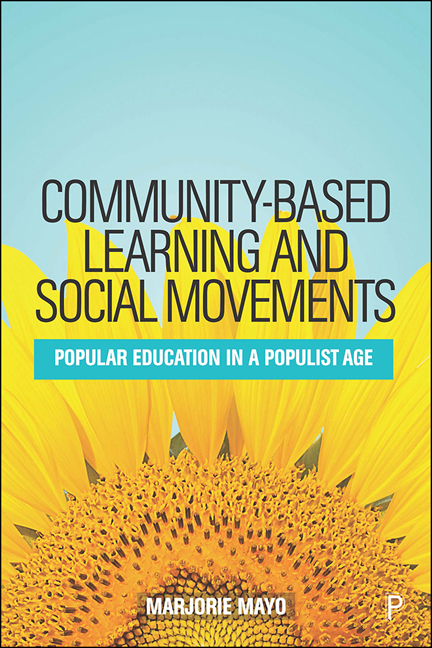Book contents
- Frontmatter
- Dedication
- Contents
- List of Figures
- Acknowledgements
- 1 Popular Education in a Populist Age
- 2 Popular Education and its Roots
- 3 Spaces and Places for Popular Education and Participatory Action Research
- 4 Principles and Practice
- 5 Sharing Understandings of Varying Histories and Cultures
- 6 Making Connections: Linking Issues and Struggles Across Space and Time
- 7 Power and Power Analysis
- 8 Community–University Partnerships
- 9 Taking Emotions into Account
- 10 Looking Backwards, looking Forwards
- References
- Index
2 - Popular Education and its Roots
Published online by Cambridge University Press: 10 March 2021
- Frontmatter
- Dedication
- Contents
- List of Figures
- Acknowledgements
- 1 Popular Education in a Populist Age
- 2 Popular Education and its Roots
- 3 Spaces and Places for Popular Education and Participatory Action Research
- 4 Principles and Practice
- 5 Sharing Understandings of Varying Histories and Cultures
- 6 Making Connections: Linking Issues and Struggles Across Space and Time
- 7 Power and Power Analysis
- 8 Community–University Partnerships
- 9 Taking Emotions into Account
- 10 Looking Backwards, looking Forwards
- References
- Index
Summary
This chapter identifies popular education's definitions and roots in the UK and elsewhere, exploring competing approaches to popular education and participatory action research, both in theory and in practice. This summary includes the approaches developed by Paulo Freire in Brazil (1972), Myles Horton in the US (Bell et al, 1990) and Orlando Fals Borda in Colombia (1985), approaches that have had their own roots in wider debates in educational theory and practice, internationally, over time. Having identified the varying strands of popular education in their economic, political and social contexts, the chapter concludes with a brief summary of the development of participatory action research, knowledge democracy and active citizenship – including approaches being developed via community– university partnerships (Tandon, 2005; Fryer, 2010; Hall et al, 2012a; English and Irving, 2015).
What do we mean by ‘popular education’ anyway?
The Popular Education Network (PEN) is an international network of university-based teachers and researchers who share concerns with popular education and participatory action research. PEN has defined ‘popular education’ as follows.
Popular education is understood to be popular, as distinct from merely populist, in the sense that it is:
rooted in the real interests and struggles of ordinary people
overtly political and critical of the status quo
committed to progressive social change. (Crowther et al, 2005a: 2)
In other words, ‘popular education’ is far from being neutral. On the contrary: popular education is aligned with wider efforts to promote a more socially just social order through democratic change processes, based on a clear analysis of the underlying causes of social inequality, exploitation and oppression, and the power relationships that underpin them. In this sense, popular education is profoundly political, although not party political per se (whereas the more directly party political approaches are described as being ‘popular political education’ in the chapters that follow).
This broad alignment with wider movements for transformative social change implies the need for democratic, participatory approaches to teaching and learning in practice, in PEN's view.
- Type
- Chapter
- Information
- Community-based Learning and Social MovementsPopular Education in a Populist Age, pp. 19 - 40Publisher: Bristol University PressPrint publication year: 2020



